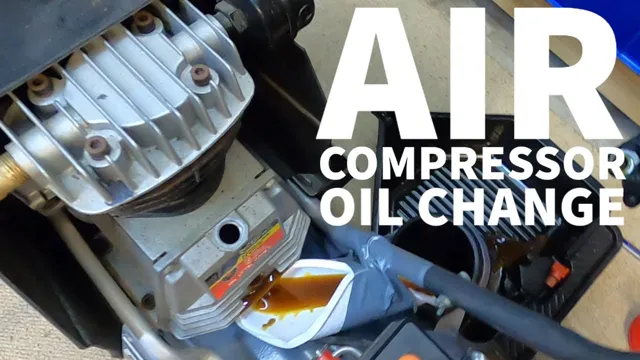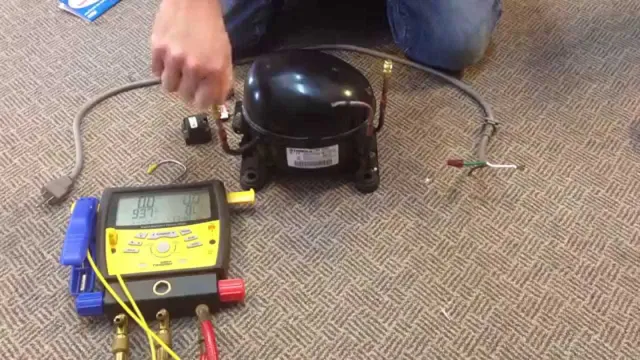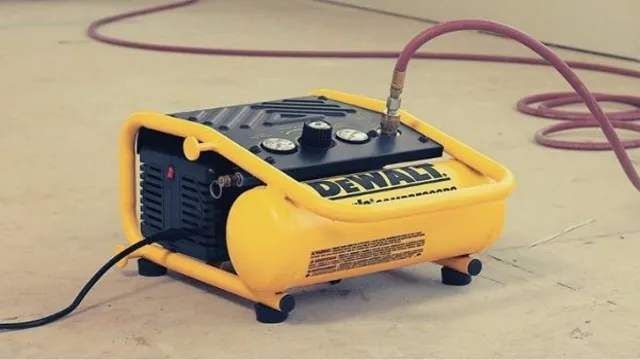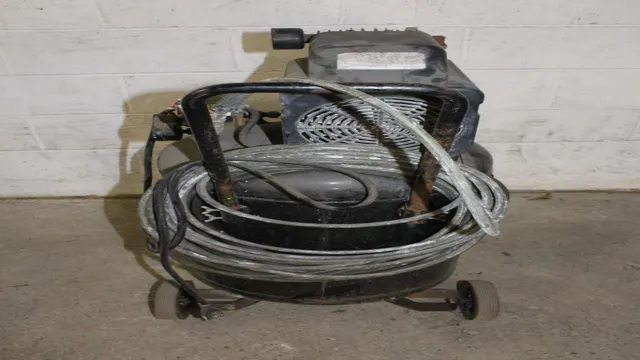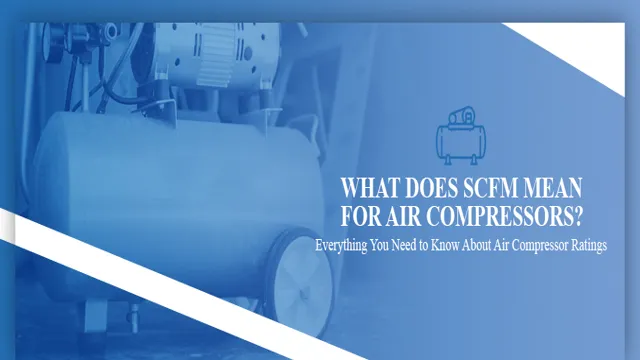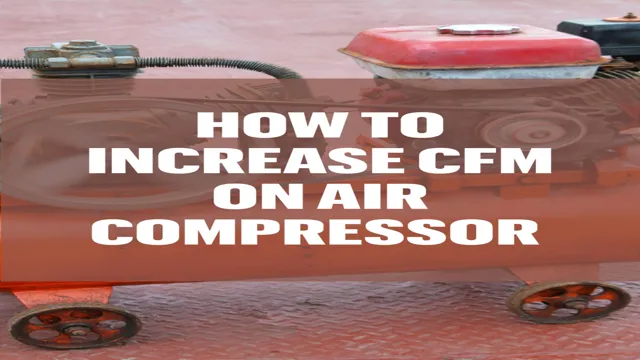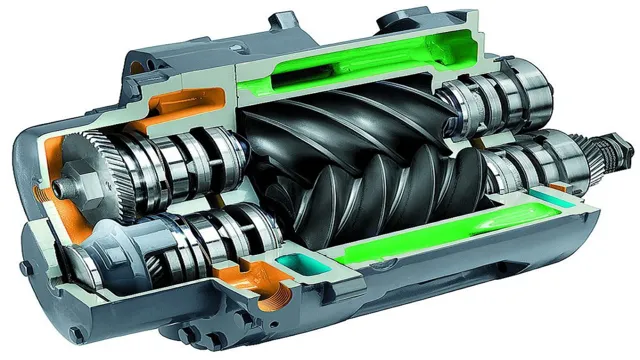How to Calculate Air Compressor Efficiency in 5 Simple Steps

Air compressors play a crucial role in many industries, from providing power to pneumatic tools to driving conveyor systems. But just how efficient is your air compressor? Calculating air compressor efficiency is important because it can help you save money, reduce energy consumption, and optimize your compressor’s performance. In this article, we’ll explore what air compressor efficiency is, how to measure it, and some tips for improving it.
We’ll also cover some common mistakes people make when calculating compressor efficiency and how to avoid them. So, buckle up and let’s dive into the world of air compressor efficiency!
Understanding Air Compressor Efficiency
If you want to know how efficient your air compressor is, there is a simple formula you can use to calculate it. First, you need to measure the input power of your compressor, which is the amount of power it consumes. Then, you need to measure the output power, which is the amount of power it produces.
To calculate efficiency, you divide the output power by the input power and multiply it by 100. The resulting number is your compressor’s efficiency percentage. A high efficiency percentage means that your compressor is using less energy to produce the same amount of compressed air, which leads to lower operating costs and better overall performance.
There are several factors that can affect compressor efficiency, such as proper maintenance, air leaks, and operating conditions. Regular maintenance and addressing any issues promptly can help improve efficiency and prolong the life of your compressor.
Efficiency Formula
Air Compressor Efficiency The efficiency of an air compressor is an essential consideration when selecting an air compressor. Efficiency refers to how well the compressor converts electrical energy into compressed air. As the compressor converts energy, some of it is lost to heat.
The more heat lost, the less efficient the compressor is. The formula for efficiency is the output power divided by the input power. The output power is the power generated by the air compressor, and the input power is the electrical power supplied to the compressor.
The efficiency of a compressor can affect its lifespan, maintenance, and operating costs. Higher efficiency compressors not only use less power, but they also produce less heat and require less maintenance, making them more cost-effective in the long run. Therefore, it is crucial to consider efficiency when selecting an air compressor.
Measuring Air Compressor Efficiency
If you want to get the most out of your air compressor, it’s important to know how to calculate its efficiency. The efficiency of an air compressor is measured by the amount of power it uses to compress air, compared to the amount of compressed air that is actually produced. To calculate this efficiency, you can use a simple formula: divide the actual output of compressed air by the input power required to run the compressor.
The result is a percentage that represents the efficiency of your system. Generally speaking, an air compressor with an efficiency rating of 50% or higher is considered to be efficient. Factors like the size of your compressor, the type of motor it uses, and the operating temperature can all affect its efficiency.
By regularly measuring the efficiency of your air compressor, you can make sure that you’re getting the most value for your energy dollar and keeping your system running smoothly.
Power Requirement Measurement
When it comes to measuring the efficiency of your air compressor, power requirement measurement is an essential process. This involves calculating the amount of power that your air compressor requires in order to perform its function. By doing so, you can determine how much energy your compressor consumes, and therefore, how efficient it is at converting power into compressed air.
This information can be used to identify areas where you can improve the efficiency of your compressor, such as by optimizing your maintenance schedule or upgrading to a more efficient motor. Ultimately, by measuring your air compressor’s power requirement, you can reduce your energy costs and improve the performance of your compressed air system. So, next time you want to assess the efficiency of your air compressor, be sure to measure its power requirement to get an accurate assessment.
Airflow Measurement
When it comes to measuring the efficiency of your air compressor, one of the key factors to consider is airflow measurement. This involves measuring the volume of air that the compressor is able to produce, which is a critical indicator of its overall performance. By measuring airflow, you can determine how effectively your compressor is delivering compressed air to your tools and equipment, and identify any potential areas where you may be losing efficiency.
This information can help you optimize your compressor settings and maintenance routine, ensuring that you’re getting the most out of your equipment and reducing costs over time. So, if you want to ensure that your air compressor is running at peak performance, make sure to keep an eye on your airflow measurements and take any necessary steps to optimize your setup.
Pressure Measurement
When it comes to measuring air compressor efficiency, pressure measurement is key. Pressure is the force exerted by the compressed air on the walls of the tank or pipe and it’s important to ensure that the pressure levels are consistent and accurate. One way to measure pressure is through a pressure gauge that indicates the amount of pressure inside the compressor tank.
Another important factor to monitor is the pressure drop, which is the difference between the air pressure at the compressor and the pressure at the point of use. A high pressure drop indicates that the compressor is working harder than it needs to, which leads to lower efficiency and higher energy costs. By consistently monitoring pressure levels and pressure drop, air compressor efficiency can be optimized, leading to cost savings and increased productivity.
Factors Affecting Air Compressor Efficiency
Air compressor efficiency is vital for industries that rely on compressed air for their operations. To calculate the efficiency of an air compressor, you need to consider several factors. These include the compressor’s output pressure, the amount of air it produces, and the input power.
The efficiency of an air compressor is the ratio of output energy (i.e., compressed air) to input energy.
The higher the efficiency, the more cost-effective the air compressor becomes, as it uses less energy to produce the same amount of compressed air. Other factors affecting air compressor efficiency include ambient temperature, humidity, and maintenance. Regular maintenance ensures the compressor operates optimally and lasts longer, keeping energy consumption low.
By calculating the air compressor efficiency, you can identify areas for improvement and take corrective action to maximize energy efficiency.
Age and Maintenance of Compressor
When it comes to air compressor efficiency, there are several factors that can impact the performance of your compressor. One of the key considerations is the age of your machine. As with any piece of equipment, older compressors may not be as efficient as newer models.
This is because the internal components of the compressor can wear down over time, causing it to work harder to produce the same amount of airflow. Additionally, regular maintenance is essential to ensuring that your compressor is performing at its best. Regularly cleaning or replacing air filters, checking for leaks, and addressing any issues as they arise can help to keep your compressor running smoothly and efficiently.
By taking care of your compressor and keeping it up to date, you can ensure that it is performing at its best and providing the airflow you need to keep your operations running smoothly.
Type of Compressor
Air compressor The type of compressor used is one of the major factors affecting the efficiency of an air compressor. There are three main types of compressors: reciprocating, rotary screw and centrifugal. Reciprocating compressors are suitable for low to medium pressure applications and are widely used in industries such as automotive and small workshops.
Rotary screw compressors, on the other hand, are best suited for continuous operation and can provide a constant source of compressed air for larger industrial applications. Centrifugal compressors are ideal for high flow applications and are commonly used in power plants and oil refineries. Each type of compressor has its advantages and disadvantages, and selecting the right type of compressor for a particular application can greatly affect the efficiency of the overall system.
Factors that should be considered when selecting a compressor include the flow rate requirements, discharge pressure and air quality requirements. Other factors that can affect the efficiency of an air compressor include the size and design of the compressor, the quality of the components used, and the amount of maintenance required. In addition, it is important to properly size the compressor to ensure that it can meet the demand of the application without wasting energy.
Overall, the type of compressor used is just one of the factors that can affect the efficiency of an air compressor. By carefully selecting the right compressor for a particular application and properly maintaining it, it is possible to achieve high levels of efficiency and reliability, while also reducing energy consumption and costs.
Improving Air Compressor Efficiency
If you’re looking to improve your air compressor efficiency, the first step is to understand how to calculate it. Air compressor efficiency is measured by comparing the amount of energy input with the amount of useful output. This is often expressed as a percentage and can be calculated by dividing the actual output by the theoretical output and multiplying by 100.
To improve efficiency, there are several things you can do. First, ensure that your equipment is well-maintained and free from leaks or other issues. Second, consider investing in a variable speed drive (VSD) compressor, which can adjust its speed based on current demand.
Third, evaluate the air demand in your facility and adjust your system accordingly. By taking these steps, you can reduce energy waste, improve your operations, and ultimately save money on operating costs.
Conclusion
After all the fancy formulas and technical jargon, calculating air compressor efficiency comes down to one simple equation: Output Power divided by Input Power. And just like in life, it’s not all about size – a smaller, well-maintained compressor can be more efficient than a larger, neglected one. So, keep your compressors well-oiled and your calculations on point, and you’ll be the master of efficient airflow in no time.
“
FAQs
What is air compressor efficiency and why is it important?
Air compressor efficiency refers to how well the compressor can convert electrical energy into compressed air. It’s important because higher efficiency means lower energy costs and better overall performance.
How can I calculate the efficiency of my air compressor?
You can calculate air compressor efficiency by dividing the actual output by the theoretical output. The actual output can be measured through a flow meter, while the theoretical output can be found through the manufacturer’s specifications.
What factors affect the efficiency of an air compressor?
Factors that affect an air compressor’s efficiency include temperature, humidity, altitude, load demand, and the compressor’s mechanical condition.
How can I improve the efficiency of my air compressor?
You can improve air compressor efficiency by maintaining and repairing the unit regularly, ensuring proper installation and ventilation, minimizing air leaks, and using efficient compressor controls.
What is the typical efficiency range for an air compressor?
The typical efficiency range for an air compressor is between 70-90%. However, some high-performance compressors can reach up to 95% efficiency.
Can air compressor efficiency be improved through the use of alternative energy sources?
Yes, air compressor efficiency can be improved through the use of alternative energy sources such as solar power or wind power. This can lead to even greater energy savings and reduced environmental impact.
Are there any regulations or standards regarding air compressor efficiency?
Yes, there are regulations and standards in place to ensure air compressors meet certain efficiency requirements. For example, the US Department of Energy has established minimum energy efficiency standards for compressors sold in the United States.

